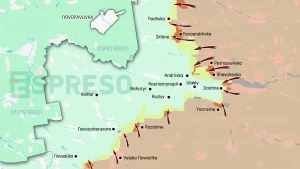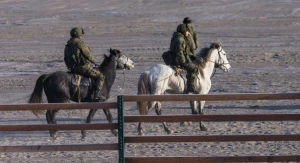
Trump, metals, and weapons: Why Ukraine trades lithium and titanium for security guarantees
U.S. weapons for Ukraine in exchange for minerals — this was part of Zelenskyy's peace plan, which he presented in the U.S. last year. And it’s something that caught the interest of businessman Donald Trump
Western media has been buzzing in recent weeks with discussions about the need for a truce between Ukraine and Russia. While Russian officials flood newspapers with their preferred vision for a May 9 peace plan, Trump’s close ally and special envoy on the war, Keith Kellogg, is making bold statements.
The first key point — the U.S. strongly urges Kyiv to use a ceasefire period to hold democratic elections. Kellogg even hinted that more than one candidate should participate, a subtle message to Zelensky not to obstruct rivals with soaring approval ratings.
The second—Trump is looking for ways to force Russia to negotiate, with sanctions as the main leverage. Kellogg stated that Donald Trump is ready to double sanctions against Russia to end the war in Ukraine. Even after Biden’s latest "farewell" oil and gas sanctions package, Kellogg rates the current measures at only 3 out of 10.
This raises an unsettling reality—had Washington imposed truly crippling sanctions earlier, Russia could have lost the war back in 2022.
While the West grapples with its feelings toward Russia, we must remain realistic. The proposal to trade weapons supplies for access to strategic rare-earth minerals is actually quite reasonable.
At this stage of the war and with the prospect of a brief ceasefire, security guarantees are unlikely, and the idea of deploying 200,000 peacekeepers remains mostly talk. What Ukraine truly needs is weapons—and a lot of them.
The fact that Americans themselves have started discussing what they call the "porcupine strategy" for Ukraine—arming it so thoroughly that no one would dare attack—is at least something tangible in a reality where another stage of war with Russia seems inevitable.
Let’s not forget that at the start of the Russia-Ukraine war, the U.S. imposed artificial restrictions on various types of weapons for Ukraine. As former Ukrainian Ambassador to the U.S. Valeriy Chaly told me in an interview, ex-President Barack Obama showed little interest in Ukraine’s war. "His only focus was on disarming Ukraine," the diplomat said.
So when Donald Trump—an eccentric politician, a populist, but above all, a businessman—expresses interest in Ukraine’s minerals, this is an opportunity worth seizing.
Years before Russia’s invasion, Ukraine might have seen angry protests led by elderly activists chanting, “We won’t give our wealth to the Americans.“ But now, when we read about how Yanukovych’s son, “Sasha the Dentist,” made billions selling coal from occupied Donbas to Turkey, we have to ask—did any ordinary Donbas residents benefit? The only thing they got was destroyed cities under Russian occupation.
After the full-scale invasion, the National Security and Defense Council (NSDC) revealed which Russian oligarchs were profiting from Ukrainian deposits and investing in Russia's defense sector. From Fridman and Deripaska to numerous lesser-known businessmen who were exporting gravel, sand, and even timber to Russia. None of these individuals called on the Kremlin to end the war, organized protests, or even appeared publicly wearing a "No to War!" t-shirt.
Wealthy Russians saw Ukraine as a place to profit and a getaway, where they could always enjoy themselves, eat, and "groped beautiful girls"—as aptly put by the miserable Artemy Lebedev, one of those bored with tourism and pickup attempts in Odessa.
What exactly caught Trump's interest in Ukraine? Minerals needed for producing smartphones, batteries, magnets, lasers, and other technology. The U.S. and China have been engaged in a global hunt for these resources—this includes the battle for the Global South and eyes on Greenland.
In Ukraine, the strategic rare-earth minerals include lithium, beryllium, graphite, titanium, nickel, and cobalt.
Ironically, for Trump’s administration, all of these are found in lands stretching from the center to the east, particularly in the Kirovohrad and Dnipropetrovsk regions. In the southeast, there are deposits in Donetsk and Zaporizhzhia regions, some of which are occupied.
The intrigue remains—does Donald Trump have an interest in tantalum and niobium ores, which are crucial for the production of semiconductors and new types of batteries?
Or consider the example of the Shevchenkivske lithium deposit, located near Kurakhove. In January, representatives of Rosatom applied for a license to extract lithium. Prior to that, according to Mariupol mayor Petro Andryushchenko, in Donetsk, representatives of Atomredmetzoloto (the mining division of the state corporation Rosatom) coordinated "permit documents" for lithium extraction with the so-called DPR "cabinet of ministers" even before the occupation.
This all points to one thing:
Either our natural resources will fall into the hands of the occupiers, enriching Russia's defense industry, which will use several months of ceasefire to rearm and correct mistakes in the "Special Military Operation in Ukraine." Or there’s a second option—securely exchanging our rare metals for weapons and direct interest from American business—to protect what’s theirs from Russian occupation.
Ukraine is not short of Russian collaborators, who have been telling us for decades how we shouldn’t let the West in. Let’s remember the massive protests in Donbas, when American companies were studying the extraction of shale gas. The result—no gas, no peace, no future. Yet, those who lied to people’s faces are now happily counting dollars in Russia, profiting from coal and grain from occupied territories.
Specially for Espreso
About the author: Maryna Danilyuk-Yarmolaeva, journalist
The editorial board does not always share the opinions expressed by blog authors
- News













































